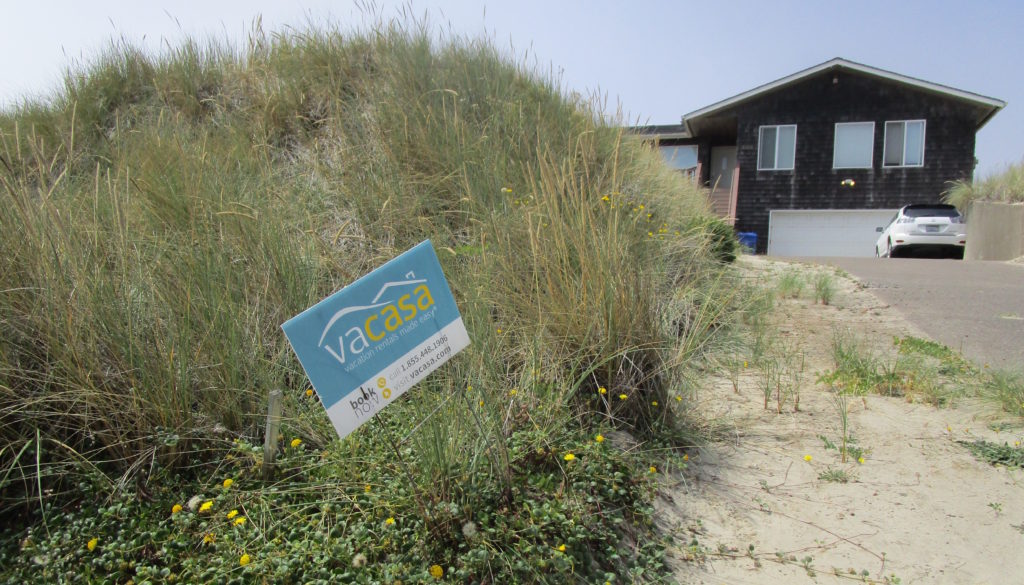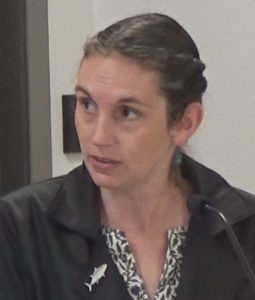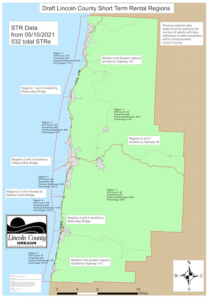
By QUINTON SMITH/YachatsNews.com
A 14-month-old moratorium on issuing new short-term rental licenses in unincorporated areas of Lincoln County has again been extended, this time for six months.
Approved by county commissioners Monday, the extension to Nov. 30 means they blew through a self-imposed June 1 deadline to settle a contentious 2-year-old debate over proliferating vacation rentals in unincorporated neighborhoods.
County Counsel Wayne Belmont and staff have struggled to work out details of proposals to tighten regulations of short-term rentals, four times asking for extension of a moratorium on issuing new licenses. More recently, Belmont has mentioned that extending the moratorium – first started in March 2020 – is not as critical an issue if the county institutes a cap on licenses, as expected.

While voting to extend the moratorium, commissioners Doug Hunt and Kaety Jacobson – Claire Hall was absent — expressed their displeasure at doing so. Commissioners three times in 2020 extended the moratorium, the last time in December by six months to June 1. Much of the delay last year was due to staff responding to the coronavirus pandemic and Otis wildfire.
“I just really want to be done with this process,” Jacobson said Monday. “It’s been a year.”
Hunt agreed.
“I’m disappointed we’re having to extend this again … but I also believe if we’re going to do it, let’s do it right,” he said.
The work will also be complicated by the July 9 retirement of Belmont, who for 35 years as served in the unusual dual role as both the county’s top lawyer and its administrator. Commissioners are seeking a new administrator, but are unlikely to find someone before Belmont’s scheduled departure. Commissioners say Belmont has indicated some willingness to work on contract the transition to a new administrator and possibly on some lingering issues.
Details in new regional map

However, following suggestions from three weeks ago, Belmont was able Monday to show commissioners a new map of seven regions of the county depicting the number of current addresses and the number of licensed rentals.
Rather than a countywide limit on licenses, commissioners want to explore breaking the county into regions and establishing vacation rental caps in each. The caps could be based either on a certain percentage of addresses in each region or a certain number.
According to the county’s mapping, the regions look like this:
- Region 1: From the county line in the north to the Depoe Bay Bridge: 2,210 addresses, 157 rentals — 7.1 percent;
- Region 2: Depoe Bay Bridge to Yaquina Bay Bridge: 446 addresses, 25 rentals – 5.5 percent;
- Region 3: Yaquina Bay Bridge to Beaver Creek Bridge: 284 addresses, 40 rentals – 14.1 percent;
- Region 4: Beaver Creek Bridge to Alsea Bay Bridge: 1,374 addresses, 146 rentals – 10.6 percent;
- Region 5: Alsea Bay Bridge to Lincoln-Lane county line: 87 addresses, 87 rentals – 23.3 percent;
- Region 6: All unincorporated areas east of U.S. Highway 101 and north of Oregon Highway 20: 4,671 addresses, 43 rentals – 0.9 percent;
- Region 7: All unincorporated areas east of U.S. Highway 101 and south of Highway 20: 4,498 addresses, 34 rentals – 0.8 percent.
Hunt and Jacobson said they now preferred the “percentage” approach in each zone, but were not sure what might be too low or too high.
Hunt said the concentration of short-term rentals west of Highway 101 is “higher than I would like or is less than ideal” but wasn’t sure if a uniform percentage across five or seven zones would work.
“When you get to 10 percent or higher that seems to be awfully high,” he said.
Jacobson said while commissioners need to think about percentages “25 percent seems really high.”
Belmont said county staff would take commissioners’ comments and continue to work on the regional map.
In addition to some sort of license limit, county staff is proposing – and commissioners have indicated general support for – at least three other changes to regulations. These include lowering occupancy rates, closer oversight of septic systems, and implementing additional methods of enforcement.
Advocacy groups uphappy
Neither group advocating for or against short-term rental regulations were happy with Monday’s decision.
15neighorhoods, which has been advocating for tougher county regulations on short-term rentals, said Tuesday it was frustrated by pace of the process and that commissioners never seem to “have a thorough, meaningful discussion in a board meeting” about the proposed regulations.
Commissioners should break down the very complicated issue into smaller parts and take care of the simpler regulations – like occupancy limits and septic capacity – where there seems to be agreement, said Jim Peterson of Depoe Bay, a member of the 15neighborhoods group. Deal with the “low hanging fruit” first, Peterson suggested, and then leave more time to tackle the tougher issues of regional license caps and enforcement.
Belmont and commissioners have all previously said that reducing occupancy limits for short-term rentals would be the biggest, single thing the county can do to ease neighborhood complaints about traffic, noise, garbage and parking.
“There were things they could have done first to alleviate the biggest issues,” Peterson said. “But they have wanted to deal with everything as a package … and so here we are a year and a half later. Dealing with occupancy would have been a huge, but simple step.”
When asked about Peterson’s suggestion Tuesday, Jacobson told YachatsNews that making separate decisions on portions of the proposed regulations may be worth considering now that the process has stretched out so long. “It’s a reasonable point,” Jacobson said.
Peterson also said 15 neighborhoods has all kinds of questions about the county’s proposed mapping system, but those can be taken care of later in a more deliberative process.
“Bite the bullet,” he said. “What are they waiting for?”
VIA Oregon, a newly formed coalition of vacation rental owners and property managers, said in a statement Tuesday it was dismayed that commissioners “have once again kicked the can down the road on the short-term rental license moratorium.”
Lincoln County is experiencing the highest unemployment rate in Oregon, the group said, and “by once again delaying a decision, the commissioners continue to do a disservice to their constituents who rely on STRs for their livelihoods.
“It is unconscionable for the county to extend the moratorium, originally imposed as a 60-day period in March 2020 until November 30, 2021. Governing by inaction is not responsible leadership.”
In regard to a license cap, VIA Oregon said it would like to see commissioners study individual neighborhoods “rather than their current broad stroke approach of dividing the county into seven regions.”
“VIA Oregon does appreciate the more detailed data produced by the county, as this improves the facts behind the conversation,” the group said. “Rates of STRs were much lower across the board than the 50- to 75 percent numbers that were thrown about anecdotally in a speculative and inaccurate fashion.
“The only high figure in this data was in the south part of the county, where certain neighborhoods, such as the Bayshore community in Waldport, were built specifically as second home/STR communities,” the group said. “If a resort community has chosen to allow STRs under their governing documents, the county should respect that choice and not characterize those communities differently in the data.”


